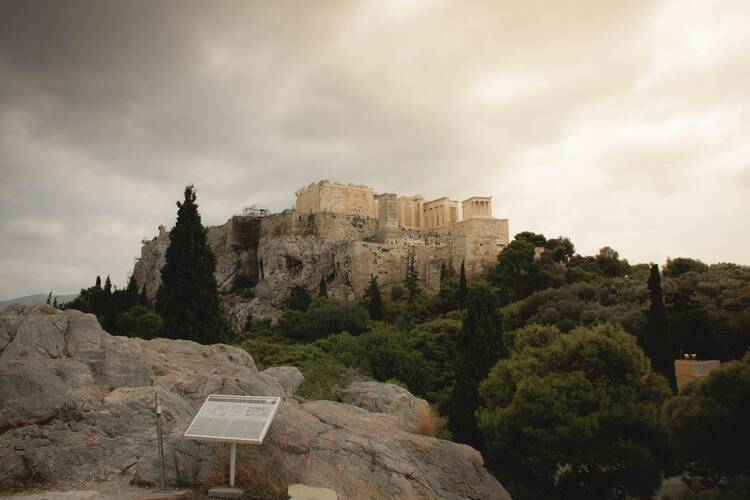A Reflection for Wednesday of the Sixth Week of Easter
“Then Paul stood up at the Areopagus and said: ‘You Athenians, I see that in every respect
you are very religious.
For as I walked around looking carefully at your shrines,
I even discovered an altar inscribed, “To an Unknown God.” What therefore you unknowingly worship, I proclaim to you.
The God who made the world and all that is in it …is he who gives to everyone life and breath and everything.’” (Acts 17:22-25)
The Areopagus is a very rocky hill with an awesome view of the Acropolis (the “city on high” where the Athenians had their temples), and when I was there, I read this passage from Acts, both on my phone and on a plaque there in Greek. But this hill where Paul stood was not simply a convenient rock on which many could see and hear him.
The Areopagus has a long history as the home of the Areopagus Court, where homicide courts were held and other governmental and sacred duties performed. He chose a place which, while not associated with the Greek gods themselves, was nevertheless holy and important to the people of Athens. Paul came to the people as they were, knowing what could speak to them and using language they could understand.
“I see that you are religious because I discovered many shrines, one of which is to an Unknown God—that God is the Creator, that is the one who sent the Savior to the world,” Paul says to the Athenians.. Paul informs them that this shrine is to his God, the God of Israel, who is now the God of the gentiles as well. This God does not require the sacrifices that the others do; he exists far above those deities and will not respond mercurially to their offerings.
Most people you and I know have heard of Jesus, whether intimately or broadly, so most people today do not seem to be in the same place as the pagan Athenians to whom Paul speaks. But do we not also have other gods, social media and money and alcohol and popularity and anything else we can deify for ourselves? Where is our shrine to the Unknown God?
Maybe you do have a physical place you go to pray, or maybe you have a time to pray to God every day without fail. Or maybe you’re like me, and you promised to pray for ten minutes a day and just keep forgetting most days. You try to not be on Instagram or Facebook for hours, but you get sucked in again.
Paul makes no mention to the Athenians that they must suddenly become perfect believers in God right after he has arrived to preach to them. But he does expect them to recognize this Unknown God as the true God and to (try, at least, to) remove the other gods from their lives so that they may repent of their sins. He asks this of them from a standpoint they can understand, and something we can hopefully understand, too: If I want to have God in my life, he must come before my vices.
God comes to us not as some unattainable being with daily changing ideals, but often in the familiar and always expecting from us what we can handle. Paul speaks to the Athenians in a place where sacred and governmental duties were performed; they only needed to come to a normal area of the city to hear him speak, and he remarks that they have already unknowingly been worshipping the true God. It is a step further to repent and turn away from our idols, but that leap can be small, not even the distance between the Areopagus and the Acropolis. And we are allowed to turn back to God over and over; it is not a one-time decision.








